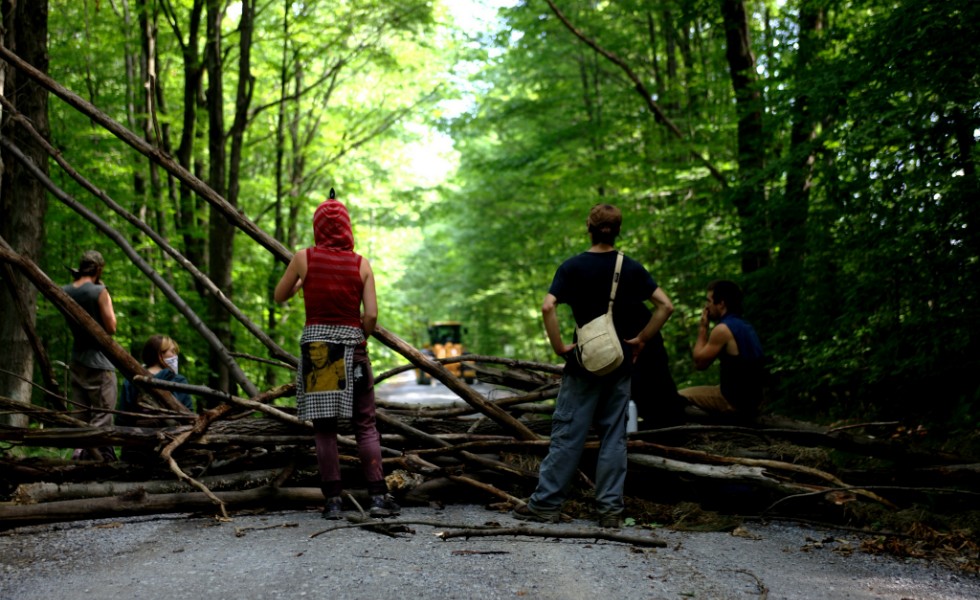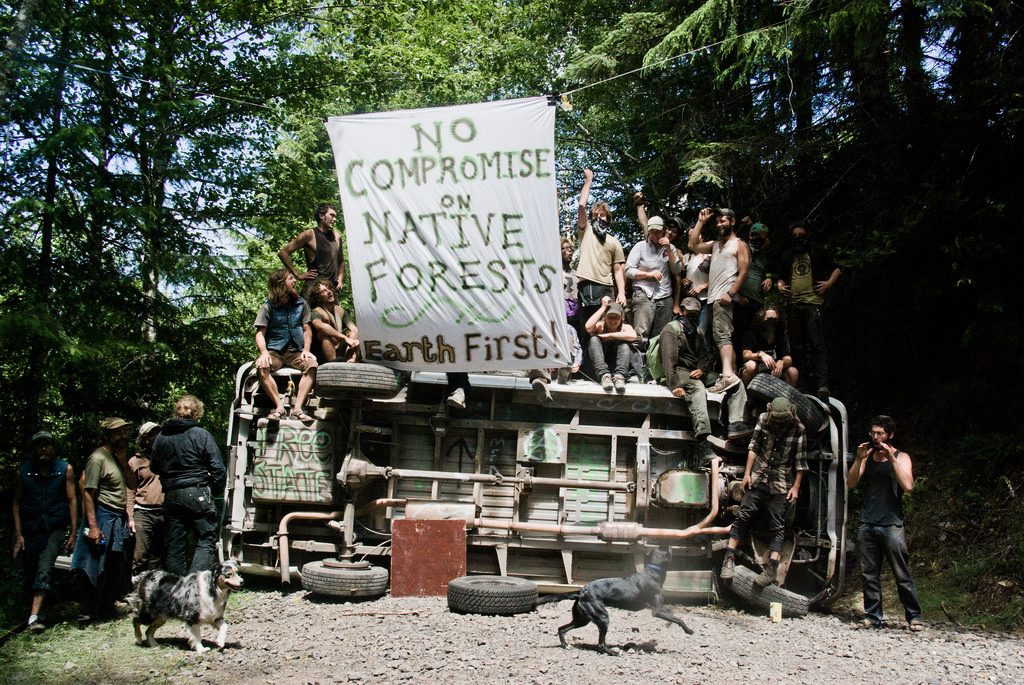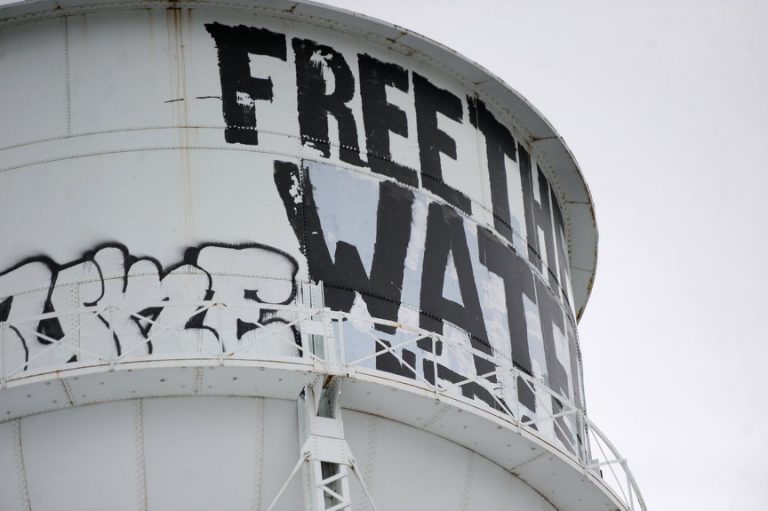Filed under: Civilization, Editorials, Environment, US

From Earth First! Journal, Winter 2015-16
By Kevin Tucker
Let’s be honest, Earth First!. Despite the fact that the green anarchist and Earth First! worlds have always run parallel to each other, and often overlap, we haven’t always been on the same page.
The late 1990s and early to mid-2000s were an exciting time. Things were escalating all around. The ELF and ALF were turning up the heat. The riots were kicking off anytime CEOs, politicians, and bankers got together. There was a lot of potential in the air. We started looking beyond traditional activism, and the EF! campaigns holding off the bulldozers, loggers, and the like lost some of their appeal. It’s not that we grew apart; we just saw and did things differently.
But the times have changed. In an era when activism is reduced to posting a picture of oneself holding some moderate sign on Twitter, your banner-hangs, treesits, and arrests get a bit of that zeal back.
Realistically, we can use each other. Earth First!’s basis of action without compromise can hold back plows and halt bulldozers; the green anarchists’ practice of hacking at the roots can identify larger targets and give context. We can do well together.
So where do we start? Let’s go to where we are now: Let’s start at the end.
Over the past years, the EF! campaign focus has rightfully moved to incorporate a new threat: post-peak oil production methods. We’re talking about fracking for natural gas, tar sands mining, and mountaintop removal. From extraction point to transportation, we aren’t facing a new monster, but we’re facing a renewed monster. We are facing a boom.
The Marcellus Shale region is a place that I will always consider home. I saw the Alleghenies get cut and crisscrossed with roads, turning the forest into a natural gas oilfield. I’ve seen that wretched fracking platform set up near my home and the places that I love, and felt earthquakes in places where they should not happen.
I’ve lived in areas where train after train has derailed, spilling tar sands crude. I’ve seen those very derailments become arguments for pipelines, which only ready the chainsaws and amplify the drive. I’ve seen waterways that could burn, and I’ve seen the life abandon them.
I’ve seen mountains blown apart. I hope that I never deal with the sludge and slurry of that extraction process, but I’ve seen what it can do. And it is fucking heart-wrenching.
The speed with which these events are unfolding and their cutthroat intensity are alarming. These aren’t just a continuation of what has been going on—they are a desperate grapple, the throes of a dying civilization, an overstretched reach. These are new methods fueled by the promise of quick cash.
These production methods are a clear and logical follow-up to the world that cheap oil has created, but they are not an answer.
And therein lies our strength.
As fracking, tar sands, and mountaintop removal continue to expand the consequences of resource dependency into back yards, the fight against these methods—and hopefully industry—also expands. You can only fuck with people’s water for so long. And so we have people who are signing on from a traditional NIMBY (Not in My Back Yard) perspective to fight against these methods and industries. This is a classic example of building a base for single-issue activism. When your water is threatened, you will react to that impulse.
This is where we can work together.
I have long said that if someone’s single issue were nuclear power, I’d be hard-pressed to argue against them. I’d wish them the best of luck and hope they were successful. Nothing is forever, but nuclear waste certainly isn’t going away anytime soon.
I typically extend that soft spot towards the struggle against resource extraction. Considering the immediate and grave consequences of these even shadier methods, any chance to stop or slow them is welcome.
But there are teeth here.
The current energy snatch-and-grab doesn’t exist in a vacuum. This is what the collapse of civilization looks like. This isn’t an event, it’s a process. It starts with sedentary hunter-collector societies and turns into plows diverting waterways to feed cities. The ecological crisis is domestication. It’s the myth of Progress: the idea that we are destined for something greater.
And in the wake lie patriarchy, sexism, social hierarchies and stratification, politics and religious indoctrination, property, borders, and the xenophobic, racist responses that they bring. Civilization, the culture of cities—that agrarian curse of social and ecological devastation—is a scourge. We’ve seen what it does in the (anti-)social context, and those within EF!’s ranks don’t need to be told what it looks like in the forest.
From the time when the first plow cut into the soil to propagate storable grains and proteins, the forest became the trees, the world became a resource. As Paul Shepard said of genetic engineering, “domestication was the first step.” The same applies to resources. Everything else is scale.
The Mayans cut cornfields with the same ferocity that oil prospectors look at forests, mountains, and pastures. Innovation is the product of desperation. So as the decades old OPEC (Organization of the Petroleum Exporting Countries) numbers for untapped oil reserves deflate, the ghost economy of credit and deficits crashes, and we are left standing before the reality of a post-peak oil world. Naked. And completely unprepared.
The same terminology invoked by OPEC to get rights to oil drilling contracts is now being pushed into Appalachia, throughout the West, and into Northern Canada (not to forget the deep water drilling throughout the oceans).
The center of a modernized, globalized, and technologically infused and dependent civilization isn’t a good place to be stranded without the proverbial lifeline. Yet this is where we stand.
All of the new and “modernized” methods for resource extraction are a last-ditch effort to drag the body of Leviathan on for another decade or two. This is the final frontier.
Hopefully none of this is new. Even when not articulated, the biocentric reaction that EF! is known for is a response to the world that civilization has implemented. EF! stands on the periphery to stake a claim for the Earth, to take action, to halt the path of Progress.
And this is where the green anarchist vision and the anarcho-primitivist critique cross paths with EF!. Regardless of how we got here, we fight on the frontlines of the primal war: in resistance to domestication, and for the complete reconnection with wildness.
We need context. We need perspective. We need to be reminded that we are in the end-times of civilization and that our enemy is vulnerable. We have teeth.
We have traction.
So here we arrive at the end.
As water contamination becomes the norm, the war comes home. The response will be to draw in the dispossessed and concerned to funnel through a single issue—NIMBY activism that stands in opposition to extraction methods, but offers few answers. These are people responding to dire circumstances, and finding their breaking points.
Our weapon is that the single issue they are struggling against is the issue. What happens when those attempting to domesticate and suppress the world start running out of options? What happens when the plow hits the end of the Earth and starts turning through it? What happens when mountains are blown apart and the ground we stand on is shaking?
This isn’t bad policy; it’s the end result of policy. The fracking well is the logical conclusion of the plow. The single issue is civilization itself. It is this simple: Do you want water, or do you want electricity for a couple more years?
Obviously this isn’t the discussion that is being had; but we aren’t really in the discussion stage anymore. The nature of a boom is that things happen quickly. There is only reaction. And to that end, the tactics of EF! are a perfectly apt response.
But here is the potential: We can draw the lines, we can force the discussion, and we can connect the dotted landscape of wells, derailed trains, and chemical spills.
The lifeblood of this modernized civilization is the energy that flows through your surroundings: by railway; through power lines, shipping canals, substations, and conversion stations; damming rivers and cutting roads. This is the manifestation of domestication. If the discussion that is to be had stems directly from the source of that power and what it looks like to extract, pump, and transport it, then we have the chance to be on the offense instead of the defense.
This is the time to stand by “no compromise in defense of Mother Earth.” The end is in sight. The vulnerabilities lie before us. The failure of activism has been in the defeated hopes of holding off the destruction. The promise of resistance lies in bringing about the destruction of the infrastructure that is unfolding before us; in joining with the world of wildness and bleeding out Leviathan; in pulling the plug.
We’re on mutual turf here and the Earth is on the line.
The roots of civilization have been exposed and the extent to which the domesticators are willing to reach is becoming clearer. The chance to dig deeper is in our hands.
Let’s take the actions. Let’s take the discussion. Let’s bleed the machine.
Kevin Tucker is an anarcho-primitivist writer who considers Appalachia home. He is the founding editor of Black and Green Review, author of For Wildness and Anarchy, and runs Black and Green Press when he isn’t being schooled on wildness by his daughters.








